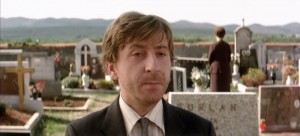Gravehopping
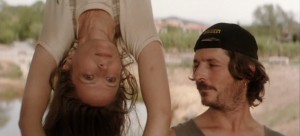 During my first year of college, when I was still a film student, I met a Spaniard, also in the film program, who bragged about not watching any movies. “I don’t want to have any outside influences,” he said. I tried explaining the notion of parallel thinking; my senior year of high school I wrote a chase scene that began aboard a New York City train that was remarkably similar in style and content to the famous one in The French Connection. I was unaware of this because the actors I was using weren’t film enthusiasts who spent their time watching 25 year old movies, and because I didn’t see The French Connection until six months after finishing the script. I felt foolish, but a little grateful that the scene was far too complex, would have required a great deal of permission from the police to execute, and a slew of permits that I would not have been able to afford on my enormous $236 budget.
During my first year of college, when I was still a film student, I met a Spaniard, also in the film program, who bragged about not watching any movies. “I don’t want to have any outside influences,” he said. I tried explaining the notion of parallel thinking; my senior year of high school I wrote a chase scene that began aboard a New York City train that was remarkably similar in style and content to the famous one in The French Connection. I was unaware of this because the actors I was using weren’t film enthusiasts who spent their time watching 25 year old movies, and because I didn’t see The French Connection until six months after finishing the script. I felt foolish, but a little grateful that the scene was far too complex, would have required a great deal of permission from the police to execute, and a slew of permits that I would not have been able to afford on my enormous $236 budget.
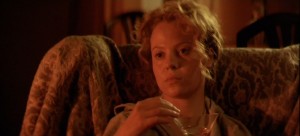 The Spaniard’s outlook is one that Gravehopping writer/director Jan Cvitkovic came to the filmmaking table with, claiming to have no influences whatsoever. So Cvitkovic would often be amused by the interpretations by local film critics, citing the masters that he was obviously tipping his hat to. Cvitkovic is an archaeologist by trade, which makes perfect sense considering his obsession with dirt and digging throughout Gravehopping. Whether he should be blamed for ripping off Harold & Maude, with the father character always trying to find elaborate ways to kill himself, tweaked for comedic effect… Well that probably just comes from Cvitkovic’s attempt to play with our expectations on how human beings react to death.
The Spaniard’s outlook is one that Gravehopping writer/director Jan Cvitkovic came to the filmmaking table with, claiming to have no influences whatsoever. So Cvitkovic would often be amused by the interpretations by local film critics, citing the masters that he was obviously tipping his hat to. Cvitkovic is an archaeologist by trade, which makes perfect sense considering his obsession with dirt and digging throughout Gravehopping. Whether he should be blamed for ripping off Harold & Maude, with the father character always trying to find elaborate ways to kill himself, tweaked for comedic effect… Well that probably just comes from Cvitkovic’s attempt to play with our expectations on how human beings react to death.
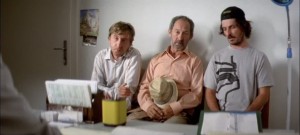 Gravehopping, also known more appropriately as From Grave to Grave, is misleading in that way; the main character Pero (Gregor Bakovic), who, as his form of employment gives outlandish and self-indulgent speeches at funerals, has no irony about his work. The audience views Pero’s preparations and the actual words coming out of his mouth as ridiculous, and maybe the bereaved do too (it’s never made overtly clear) but they’re too sad to speak up, thinking that it would be rude and disruptive to do so. Is that why Pero continues to get work, despite his obvious shortcomings? One assumes that in this small Slovenian village, the locals don’t use the Better Business Bureau much.
Gravehopping, also known more appropriately as From Grave to Grave, is misleading in that way; the main character Pero (Gregor Bakovic), who, as his form of employment gives outlandish and self-indulgent speeches at funerals, has no irony about his work. The audience views Pero’s preparations and the actual words coming out of his mouth as ridiculous, and maybe the bereaved do too (it’s never made overtly clear) but they’re too sad to speak up, thinking that it would be rude and disruptive to do so. Is that why Pero continues to get work, despite his obvious shortcomings? One assumes that in this small Slovenian village, the locals don’t use the Better Business Bureau much.
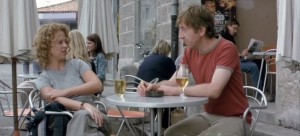 The early scenes of Gravehopping have such a droll attitude towards death that the movie is bound to catch you by surprise if and when it adjusts its tone. Pero’s mechanic friend (who dates Pero’s mute sister) assumes that Pero will have time off during a long weekend because “it’s a new moon, no one will be dying now.” Pero’s father, the suicidal Dedo, goes to a psychologist who insists that he write an essay on why he wants to commit suicide. The opening funeral scene has a brass band score, playing a cover of Gloria Gaynor’s disco classic “I Will Survive.” Cvitkovic cleverly lowers our guard so even when there’s a bit of unexpected violence, in the next scene, Pero sits at his dinner table, dressed like Where’s Waldo?
The early scenes of Gravehopping have such a droll attitude towards death that the movie is bound to catch you by surprise if and when it adjusts its tone. Pero’s mechanic friend (who dates Pero’s mute sister) assumes that Pero will have time off during a long weekend because “it’s a new moon, no one will be dying now.” Pero’s father, the suicidal Dedo, goes to a psychologist who insists that he write an essay on why he wants to commit suicide. The opening funeral scene has a brass band score, playing a cover of Gloria Gaynor’s disco classic “I Will Survive.” Cvitkovic cleverly lowers our guard so even when there’s a bit of unexpected violence, in the next scene, Pero sits at his dinner table, dressed like Where’s Waldo?
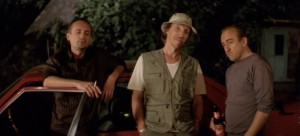 And it’s not just the approach that’s different in Gravehopping, the audience’s lack of knowledge about the how Slovenia became a Democratic sovereign nation is an advantage. The actors have such a unique look, often with sad, oval-shaped faces, which might suggest a slowness or simplicity, exacerbated by what appears to be a mostly farm and fishing culture. Technology isn’t very evident, and Cvitkovic, ever the spiritual skeptic archaeologist, never makes it obvious that Slovenia is primarily secular, unlikely to bow to more faith-based pressures.
And it’s not just the approach that’s different in Gravehopping, the audience’s lack of knowledge about the how Slovenia became a Democratic sovereign nation is an advantage. The actors have such a unique look, often with sad, oval-shaped faces, which might suggest a slowness or simplicity, exacerbated by what appears to be a mostly farm and fishing culture. Technology isn’t very evident, and Cvitkovic, ever the spiritual skeptic archaeologist, never makes it obvious that Slovenia is primarily secular, unlikely to bow to more faith-based pressures.
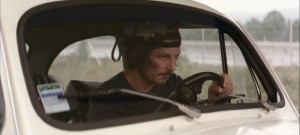 Cvitkovic does outsmart himself at times, there’s too much showoffy fancy camerawork (a crane shot over a cemetery is especially egregious), and his shoehorning in of a Raymond Carver-style fisherman subplot is anything but elegant. That the sister is an adorable mute* who looks and acts like the willowy Emily Watson in Breaking the Waves is not a matter of Cvitkovic betraying his monk-like attitude towards film and ripping off Lars Von Trier, but rather just being lazy and reducing some characters to a “thing” instead of a person. After all, clichés are universal, no matter how much ignorance you claim.
Cvitkovic does outsmart himself at times, there’s too much showoffy fancy camerawork (a crane shot over a cemetery is especially egregious), and his shoehorning in of a Raymond Carver-style fisherman subplot is anything but elegant. That the sister is an adorable mute* who looks and acts like the willowy Emily Watson in Breaking the Waves is not a matter of Cvitkovic betraying his monk-like attitude towards film and ripping off Lars Von Trier, but rather just being lazy and reducing some characters to a “thing” instead of a person. After all, clichés are universal, no matter how much ignorance you claim.
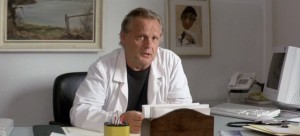 Perhaps if Cvitkovic had been aware of the major problems that screenwriters come across in trying to properly develop a third act, he would have attempted a smoother entry towards the more melodramatic and kitchen-sink elements of Gravehopping. Cvitkovic’s instincts towards the quiet (his 2003 short, The Heart is a Piece of Meat, featuring two of the supporting actors from Gravehopping, has no dialogue) are what help him when he’s out of his depth. Sometimes wordlessness is about subtlety, sometimes it’s about not knowing what to say. The beauty is that there’s no way to tell the difference.
Perhaps if Cvitkovic had been aware of the major problems that screenwriters come across in trying to properly develop a third act, he would have attempted a smoother entry towards the more melodramatic and kitchen-sink elements of Gravehopping. Cvitkovic’s instincts towards the quiet (his 2003 short, The Heart is a Piece of Meat, featuring two of the supporting actors from Gravehopping, has no dialogue) are what help him when he’s out of his depth. Sometimes wordlessness is about subtlety, sometimes it’s about not knowing what to say. The beauty is that there’s no way to tell the difference.
And a Jesus martyr mute, at that.



